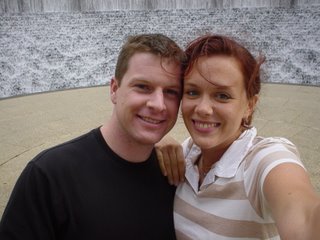Right now, I'm sitting in my office at the church, and the iTunes playlist from my wedding reception is playing (and Yellowcard's "Only One" has just come on, and while the sentiment seems to fit, I'm wondering why Leigh thought it was a tune appropriate to our laid-back, soft time of dancing), and I'm looking at this blog screen for the first time in almost a month, and I don't feel all that different, but I know that I am different. For one thing, I'm still aware of this ring around my finger. I've never really been a ring-wearing kind of guys, unless you count that ugly, gold pinkie ring sporting my initials that I bought when I was a desperate-to-seem-cool teenager at Six Flags Fiesta Texas (which I thankfully lost soon after), or that silver James Avery promise ring I wore up until college when I gave it to a girlfriend (who, whether I should have taken it as a convenient omen or not, subsequently lost it).
But this ring around my finger is a peculiar thing. It's plain white gold, already becoming scratched, and certainly isn't an attention-drawing accessory, but I do remember that it stands for something sacred, something sacramental (yes, yes, I would be a Catholic if I were only a bit braver and more tolerant). I'm wondering how hard it is going to get to remember what this ring stands for ... or to even maintain the ability to notice this little silver thing at all. I suspect that is one of the things that happens in so many marriages - he or she loses sight of the sacramental - or, for a more ecumenical word, holy - factor of it all. The memory of the vows, the ceremony, the promise, the worship of that day kind of fades away.
Leigh was telling me the other day, while on our way to the airport for our honeymoon, that it is important to recollect out loud to each other all our memories from our wedding: the rehearsal, rehearsal dinner, ceremony, and reception - all of it. She explained to me that two of our friends, who I like to call Jenny Squared (I have to write out "squared" because Blogger doesn't offer superscript), had told her that if you don't continually share your memories of the wedding with each other, soon it will fade from memory, and the loss will hurt. They assured her that it goes by so fast for the bride and the groom that calling moments back to mind, again and again, is imperative. I'm less than two weeks removed from that day, and I could not agree more. It did go by awfully fast.
There's a small, deep anxiety within me that I will not be able to maintain my recognition of both the vows and the beauty of my union with Leigh as time goes on. I look around me at different couples that are struggling, that have called it quits... I watch movie after movie and show after show about fizzled marriages... I read about them, I hear about them, I sometimes can even watch them crumble right in front of me... and I wonder how in the world I will ever be able to succeed where so many others have failed.
But then I remember two things. Number one, it is not about "I," but "we." I cannot succeed, but we just might have a chance. After all, isn't that what bearing with one another and submitting to one another is all about? Number two, we serve a good, loving God, who, as I was reading just yesterday, invites us not only into a relationship with Him, but one marked by providence and provision. Not the popular name-it-and-claim-it, God-wants-me-to-be-successful-and-realize-my-potential crap religion, but a faith that calls me into humility, to realize it is not by any special deed or flowery incantation that God will notice and condescend to me, but simply because I come before Him, admitting that I don't really get it, and can't really do it, but - and, of course, this is the key that even fewer of us turn - I will blindly trust in both His power and desire to do it in my stead.
Yesterday morning, the Liturgy of the Hours (there's me being Catholic-ish again) brought me to Psalm 37. "Commit your way to the Lord, trust also in Him, and He will do it. He will bring forth your righteousness as the light and your judgment as the noonday. Rest in the Lord and wait patiently for Him..." (v. 5-7a). A selfish person would fixate on being made righteous in the eyes of everyone else, especially his or her selected enemies. On the contrary, I suppose a humble person would simply take comfort in being made righteous before God. And, in the end, that is what I want for Leigh and I, and what I believe this centuries-old, prayerful song is promising.
So, let it be. Let it be.
___________________
Here are some of my favorite pictures from the wedding. You can view a lot more by going to www.chasingfeathers.smugmug.com. I've got to quickly plug Rachel, our photographer. She did an amazing job, and if you're in the central Texas area, you should definitely hire her for whatever, weddings, parties, grocery store trips, lynch mobs, whatever... Oh, and Sabrina, my buddy, you did a great job, too.







 It was a good day...
It was a good day...




